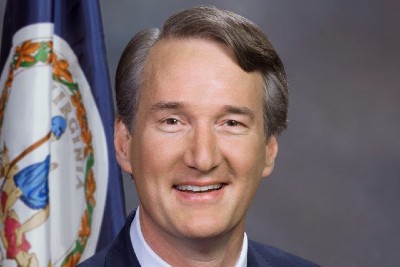
Gov. Glenn Youngkin ceremonially signed five bills on Tuesday, including three enacting meaningful reform of the Virginia Employment Commission.
“From day one, a top priority of my administration has been to address the significant challenges at the VEC. The VEC faced an unprecedented number of unemployment claims during the peak of the pandemic, facing fifty times the claims in a normal week,” Youngkin said. “These bills will go a long way in making government work for the people again, improving the VEC’s operations to ensure they are ready to handle any future economic challenges and promoting process integrity to ensure we can detect and stop fraud.”
“The Virginia Employment Commission’s failures during 2020 and 2021 caused real harm and genuine hardship for countless Virginians and their families,” said Del. Kathy Byron. “The legislation being signed by Gov. Youngkin today, and in particular its mandated ‘Resiliency Plan,’ will prevent a recurrence of that failure and improve an agency that is long overdue for reform.”
“Virginians who struggled for assistance during the pandemic have experienced significant delays in their time of need,” said State Sen. Jeremy McPike. “This bill sets forward much needed reforms and oversight of the Virginia Employment Commission to make sure improvements are implemented to serve our Commonwealth.”
“The COVID-19 pandemic exposed a lot of inefficiencies in our state agencies. The Virginia Unemployment Commission was tasked with delivering millions of dollars of unemployment benefits when Virginians were out of work because of government-imposed shutdowns. Unfortunately, the agency was ripe for fraud and abuse. News reports cited millions of dollars being paid to prisoners and improper payment rates over eleven percent,” said State Sen. Bryce Reeves. “Senate Bill 769 puts proper guardrails in place at VEC and requires them to work with other state agencies to verify unemployment claims and perform system integrity checks. We have a fiduciary responsibility to the taxpayers of Virginia and this bipartisan legislation will produce some much needed accountability.”
Youngkin also signed two bills that provide a pathway for businesses to provide private family leave for their employees.
“Until today, there has been no state permitting companies to offer insurance plans that cover family leave benefits,” Youngkin said. “I am proud to say that Virginia is leading the way by being the first state to pass legislation like this. It’s important to find solutions that balance the needs of workers with the flexibility needs of businesses, their employees and families.”
“I was proud to patron HB 1156 and make Virginia the first state to establish a voluntary private family leave insurance market for employers,” Byron said. “My approach has always been to work with businesses, not against them, and HB 1156 is a common-sense approach that will allow the market to help provide more family leave coverage to employees in the Commonwealth.”
“I am delighted that SB 15 and HB 1156 will soon become law. These bills represent an important step forward in providing employees with paid family leave,” State Sen. Barbara Favola said. “It is absolutely critical that mothers and fathers be able to care for their children and family members without having to give up a paycheck. I hope one day all employees will have access to this important family friendly and work friendly support.”
“The law signed today by Gov. Youngkin is a model for advancing paid family leave for workers nationwide,” said American Council of Life Insurers President & CEO Susan Neely. “The initiative is noteworthy for its bipartisan approach and the valuable capability it gives to employers as they meet the needs of their workforce. We hope that other states adopt similar measures that allow workers to provide essential care for themselves or a loved one without the threat of economic loss.”
“Our small business owners are struggling to hire and keep qualified workers. According to a recent NFIB survey, 48 percent of small business owners have open positions they can’t fill. The labor market is tight and our entrepreneurs need more tools in their tool box to recruit employees. That’s why this bill is so important because it opens up a market that Virginia small business owners have been asking for. Small business owners now have the flexibility to offer their employees a plan that makes the most sense for their needs,” said Julia Hammond, National Federation of Independent Buiness state director in Virginia.
Background
HB 270, patroned by Byron, R-Bedford, and SB 219, patroned McPike, D-Prince William, which aligns administrative and reporting processes of the Virginia Employment Commission with recommendations outlined in JLARC’s report to address many of the critical issues highlighted during the height of the pandemic. These bills incorporate ten recommendations and one policy option from JLARC’s VEC report released in November 2021.
SB 769, patroned by Reeves, R-Spotsylvania, which requires the Virginia Employment Commission to conduct all mandatory and recommended program integrity activities as identified by the U.S. Department of Labor Employment and Training Administration and the U.S. Department of Labor Office of Inspector General, perform a full eligibility review of suspicious or potentially improper unemployment claims, and recover any improper overpayment of benefits to the fullest extent authorized by state and federal law.
HB 1156, patroned by Byron, R-Bedford, and SB 15, patroned by Favola, D-Arlington, which establishes family leave insurance as a class of insurance. The bill defines “family leave insurance” as an insurance policy issued to an employer related to a benefit program provided to an employee to pay for the employee’s income loss due to (i) the birth of a child or adoption of a child by the employee; (ii) placement of a child with the employee for foster care; (iii) care of a family member of the employee who has a serious health condition; or (iv) circumstances arising out of the fact that the employee’s family member who is a service member is on active duty or has been notified of an impending call or order to active duty.










